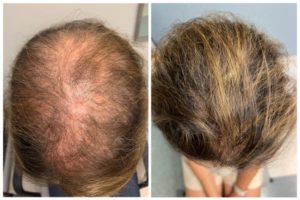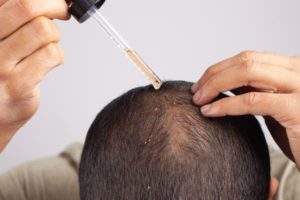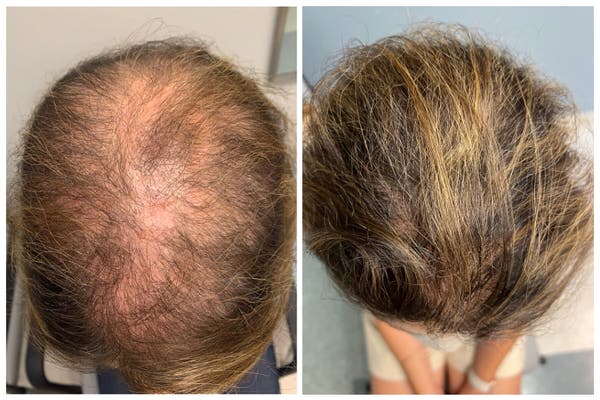Hair loss dermatologists say the key ingredient in a topical treatment worked even better when taken orally in low doses.
Advertisements are everywhere, as are exaggerated claims that special shampoos and treatments, sometimes costing thousands of dollars, will make hair grow.
But many hair loss dermatologists say most of these products don’t work.
“There is an endless array of useless remedies for hair growth,” often at “significant cost,” said Yale School of Medicine dermatologist Dr. Brett King.
Yet, he added, “because people are desperate, such remedies for hair growth continue to abound.”
Oral Minoxidil
But there is a cheap treatment, according to him and other dermatologists, that costs pennies a day, that restores hair in many patients.

This is minoxidil, an old and well-known drug for the treatment of hair loss used in a very different way.
Rather than being applied directly to the scalp, it is prescribed in very low dose pill form.
Although a growing group of dermatologists are offering low-dose minoxidil pills, the treatment remains relatively unknown to most patients and many physicians.
It has not been approved by the Food and Drug Administration for this purpose and is therefore prescribed off-label – a common practice in dermatology.

“I call us the off-label bandits — a title I’m proud to wear,” said Dr. Adam Friedman, professor and chair of dermatology at George Washington University.
He explained that dermatologists have been trained to understand how drugs work, which allows them to try off-label drugs.
In dermatology it is often clear whether a treatment helps.
Does a rash fade or not? Dr. Robert Swerlick, professor and chair of the department of dermatology at Emory University School of Medicine, agrees.
“I tell people most of the things we do are off-label because there’s nothing on the label,” he said.
He provided a long list of conditions, including pigmentary skin disorders, inflammatory skin disorders, and relentless itching, for which standard treatments are off-label.
Minoxidil, the active ingredient in Rogaine, a lotion or foam that rubs into the scalp, was first approved for men in 1988, then for women in 1992, and is now generic.
The drug’s use as a hair growth treatment was discovered by accident decades ago.
High-dose minoxidil pills were used to treat high blood pressure, but patients often noticed that the pills caused hair growth all over their bodies.
So its manufacturer developed a minoxidil lotion – eventually named Rogaine – and got it approved for growing hair on bald heads.
But dermatologists say the lotion or foam isn’t particularly effective for some patients, possibly because they stop taking it.
It has to reach the scalp itself – and the hair gets in the way.
Many, especially women, stop using it because they don’t like leaving the sticky stuff in their hair.
Johnson and Johnson, the current owner of Rogaine, did not respond to requests for comment.
Others find it just doesn’t work for them. Minoxidil must be converted into an active form by sulfotransferase enzymes which may or may not be present in sufficient amounts in the hair roots.
When the drug is taken orally, it is automatically converted into an active form.
But that was not the reason low-dose pills were discovered. Instead, the discovery also happened by accident 20 years ago.
Dr Rodney Sinclair, professor of dermatology at the University of Melbourne in Australia, had a patient with female pattern baldness.
The hair on top of her head had thinned and she hated the way it looked.
Unlike most of her patients, Rogaine worked for her, but she developed an allergic rash on her scalp from the drug.
However, if she stopped taking it, her hair would become thinning again. “So I was stuck,” Dr. Sinclair said.
“The patient was very motivated, and the only thing we knew was that if a patient is allergic to a drug applied topically, one way to desensitize them is to give them very low doses orally.”
To do this, Dr. Sinclair tried cutting minoxidil pills into quarters.
To his surprise, the low dose grew his hair but did not affect his blood pressure, the original purpose of the higher dose drug.
He then lowered the dose further and further until he reached effective doses of one-fortieth of a pill and began to prescribe the drug regularly.
This first patient is taking it again.
At a meeting in Miami in 2015, Dr. Sinclair reported that low doses of minoxidil caused hair growth in 100 successive women.
He published those results in 2017, noting that rigorous studies were needed, in which some patients would be randomly assigned to take minoxidil and others a sugar pill.But it didn’t happen.
He says he has now treated over 10,000 patients.
Recently, an increasing number of dermatologists specializing in hair loss have administered low-dose pills to patients with hair loss in both men and women, a normal phenomenon with age.
“It’s just starting to see a surge in popularity,” said Johns Hopkins School of Medicine dermatologist Dr. Crystal Aguh.
“More and more at conferences, we share our successes.”
Doctors who don’t specialize in hair loss, she added, “wouldn’t know about oral minoxidil” except as a rarely used treatment for high blood pressure that comes with a black box warning that it can cause heart problems.
But, they and others say, the warning is for much higher doses.
If the hair loss is too severe, minoxidil won’t help, Dr. Aguh warned. “It won’t work, for example, if a man is rather bald, with a shiny scalp.
There is nothing to restore. She added that the ideal patient is not completely bald but has lost enough hair that even a casual observer will notice.
Without rigorous testing leading to F.D.A. approval, however, the use of minoxidil pills for hair loss remains off-label. And, dermatologists say, it’s likely to stay that way.
“Oral minoxidil costs pennies a day,” Dr. King said. “There is no incentive to spend tens of millions of dollars testing it in a clinical trial. This study will truly never, ever be done.
However, some patients taking low-dose minoxidil notice stray hair growing on their face and chin.
So some dermatologists, including Dr. Sinclair, have added another drug – very low doses of spironolactone.
It is blood pressure medication that also blocks certain sex hormones called androgens – in an attempt to prevent unwanted hair growth.
Patients who don’t want to go the off-label route end up with what some dermatologists say are useless over-the-counter remedies or one of two FDA-approved hair growth products.
They include Rogaine and finasteride, a generic drug used in higher doses in men to treat benign prostatic hyperplasia.
As a hair loss medication, it is only approved for men. It has also been linked to sexual dysfunction.
Then there’s word of mouth about minoxidil in pill form. “I’ve seen miracles happen,” Dr. Aguh said.
One involved Brandy Gray, 44, who lives in Monkton, Maryland. “I had lost my hair over time,” she said.
“Then I started having circular patches” without hair. “They got worse and worse.”
She had seen another dermatologist who had given her shampoos and supplements, to no avail.
Finally, she said her dermatologist told her, “I can’t try anything more for you, I can’t do anything more.”
She went to see Dr. Aguh who gave her low dose minoxidil.
Ten months later, her hair was thick and lush. “I can part my hair in different ways,” she said. “I don’t wear wigs anymore.” It’s as if this hair loss never happened.
